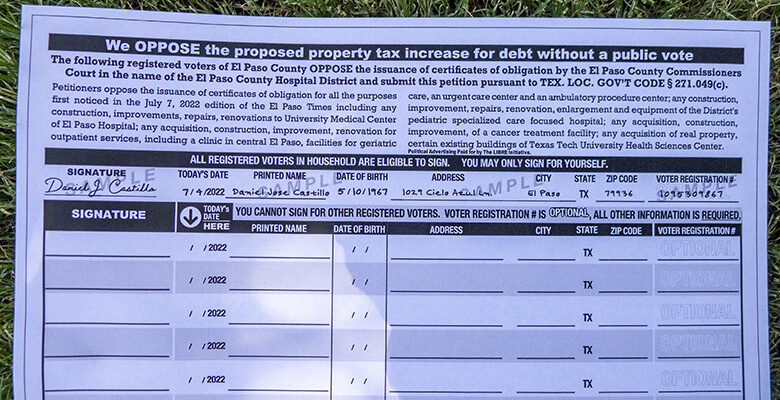You’ve probably heard about the petition circulating in opposition to the issuance of Certificates of Obligation for expansion of the University Medical Center.
Here’s what the petition says:
The following registered voters of El Paso County OPPOSE the issuance of certificates of obligation by the El Paso County CommissionersCourt in the name of the El Paso County Hospital District and submit this petition pursuant to TEX. LOC. GOV’T CODE§ 271.049(c).
Petitioners oppose the issuance of certificates of obligation for all the purposes care, an urgent care center and an ambulatory procedure center; any construction, first noticed in the July 7, 2022 edition of the El Paso Times including any improvement, repairs, renovation, enlargement and equipment of the District’s construction, improvements, repairs, renovations to University Medical Center pediatric specialized care focused hospital; any acquisition, construction, of El Paso Hospital; any acquisition, construction, improvement, renovation for improvement, of a cancer treatment facility; any acquisition of real property,outpatient services, including a clinic in central El Paso, facilities for geriatric certain existing buildings of Texas Tech University Health Sciences Center.
The petition doesn’t say that the hospital doesn’t need new facilities. The petition objects to our elected officials voting to further tax El Pasoans without the taxpayers having any say about it.
The petition just opposes the Certificates of Obligation, i.e., debt issued without taxpayer approval. If the hospital needs new facilities, they should be able to convince the voting public to approve the bonds.
Come on, El Paso voters are easily tricked. Witness, for instance, the 2012 Quality of Life bond election, and every City Council election that’s taken place in the last 10 years.
Are you telling me that those highly paid hospital administrators don’t have game?
I reckon those County Commissioners are taking their political lives in their hands if they think that they can buffalo the voters on such an expensive and high profile issue.
Up till now, the County Commissioners Court has been (practically) a model of fiscal responsibility in a county that’s regularly periodically robbed by its taxing entities.
Let’s see how it goes.

